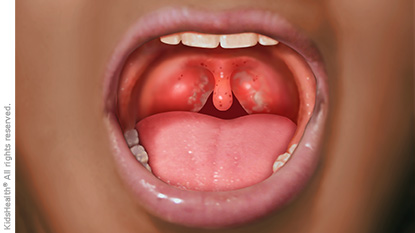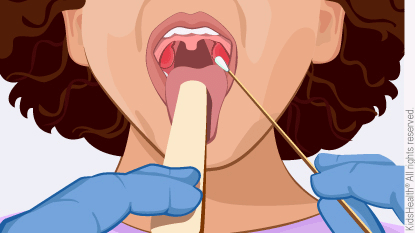- Parents Home
- Para Padres
- A to Z Dictionary
- Allergy Center
- Asthma
- Cancer
- Diabetes
- Diseases & Conditions
- Doctors & Hospitals
- Emotions & Behavior
- First Aid & Safety
- Flu (Influenza)
- Food Allergies
- General Health
- Growth & Development
- Heart Health & Conditions
- Homework Help Center
- Infections
- Newborn Care
- Nutrition & Fitness
- Play & Learn
- Pregnancy Center
- Preventing Premature Birth
- Q&A
- School & Family Life
- Sports Medicine
- Teens Home
- Para Adolescentes
- Asthma
- Be Your Best Self
- Body & Skin Care
- Cancer
- Diabetes
- Diseases & Conditions
- Drugs & Alcohol
- Flu (Influenza)
- Homework Help
- Infections
- Managing Your Weight
- Medical Care 101
- Mental Health
- Nutrition & Fitness
- Q&A
- Safety & First Aid
- School, Jobs, & Friends
- Sexual Health
- Sports Medicine
- Stress & Coping
Strep Throat in Kids and Teens
What Is Strep Throat?
Strep throat is an infection caused by a type of bacteria called group A strep (GAS). These bacteria are the most common cause of bacterial sore throat in children and teens.
Strep throat usually needs treatment with antibiotics. With the proper medical care — and plenty of rest and fluids — most kids get back to school and play within a few days.
What Are the Signs & Symptoms of Strep Throat?
The most common symptoms of strep throat include:
- sore throat that comes on quickly and is especially painful when swallowing
- fever
- red and swollen tonsils with white patches or streaks on them
- painful or swollen neck glands (lymph nodes)
Other symptoms in children can include:
- headache
- stomach pain
- nausea or vomiting
- loss of appetite
- rash. When a red rash that looks like sandpaper happens along with strep throat, the condition is called scarlet fever.
Not all sore throats are strep throats. Most sore throats are caused by viruses, not bacteria. If an older child has cold symptoms (like a runny nose or cough), a hoarse voice, or pinkeye, their sore throat is more likely to be from a virus than from strep throat. A sore throat due to a virus will usually clear up without medical treatment.
Strep throat is very uncommon in children younger than 3 years old. When babies and toddlers get infected with GAS, they tend to have fever with fussiness, poor appetite, and a runny nose, but not the typical throat problems.

Is Strep Throat Contagious?
Strep throat is very contagious. Anybody can get it, but most cases are in school-age kids and teens ages 5 to 15. Infections are common during the school year, with peaks in winter and early spring, when big groups of kids and teens are in close contact.
How Do People Get Strep Throat?
The bacteria that cause strep throat tend to hang out in the nose and throat. So normal activities like talking, sneezing, coughing, or shaking hands can easily spread an infection from one person to another. People also can get infected if they touch a surface with the bacteria on it, then touch their nose or mouth.
Kids with untreated strep throat are more likely to spread the infection when their symptoms are most severe, but can still infect others for up to 3 weeks.
After they get infected, people can spread the bacteria to others for a few days before they have any symptoms. That's why it's so important to teach kids to wash their hands well and often. This can lower their chances of getting contagious diseases like strep throat.
How Is Strep Throat Diagnosed?
If your child has a sore throat and other strep throat symptoms, call your doctor. The doctor will likely do a rapid strep test in the office, using a cotton swab to take a sample of the fluids at the back of the throat. The test only takes about 5 minutes.
If it's positive, your child has strep throat. If it's negative, the doctor will send a sample to a lab for a throat culture. The results are usually available within a couple of days.
Doctors usually don’t test for strep throat in babies and toddlers as it's very rare in those age groups. Even if they get infected with GAS, babies and toddlers don’t usually need medical treatment because they don’t seem to be at risk for the other health problems that GAS can cause in older kids.

How Is Strep Throat Treated?
Doctors usually prescribe about 10 days of antibiotic medicine to treat strep throat. Even though strep throat can go away on its own after about a week, antibiotics can help make a person feel better faster and can keep the infection from spreading to other people.
Within about 12 hours after starting on antibiotics, your child probably won't have a fever and won't be contagious. By the second or third day, other symptoms should start to go away.
Even when kids feel better, they should keep taking the antibiotics as prescribed. This is the best way to kill the harmful bacteria. Otherwise, bacteria can stay in the throat and symptoms can come back. Taking all the antibiotics also prevents other health problems that GAS can cause, such as rheumatic fever (which can cause heart damage), kidney disease, or more serious infections in other parts of the body.
Can Strep Throat Be Prevented?
There is no vaccine to protect against strep throat, and getting strep throat once doesn’t protect someone from getting it again.
If your child has strep throat, to help protect others in your family:
- Keep your child's eating utensils, dishes, and drinking glasses separate and wash them in hot, soapy water after each use.
- Make sure your child doesn't share food, drinks, napkins, handkerchiefs, or towels with other family members.
- Teach your child to cover all sneezes or coughs. If a tissue isn't handy, kids should sneeze or cough into their elbow, not their hands.
- Remind everyone to wash their hands well and often.
- Give your child a new toothbrush after the antibiotic treatment starts and they're no longer contagious.
How Can I Help My Child Feel Better?
Home care can help your child feel better while battling strep throat. Give plenty of liquids to prevent dehydration, such as water or oral rehydration solution (like Pedialyte, Enfalyte, or a store brand), especially if your child had a fever. If it hurts to swallow, try serving soft foods. Warm things like soup, tea, or hot chocolate can be soothing. So can frozen treats like smoothies, popsicles, or ice cream. Avoid orange juice, grapefruit juice, lemonade, or other acidic beverages, which can irritate a sore throat.
For fever and pain, your doctor may suggest an over-the-counter medicine, such as acetaminophen or ibuprofen. Follow the package directions on how much to give and when. Do not give aspirin to children younger than 18 years, as such use is linked to Reye syndrome, which can be life-threatening.
Talk to your doctor about when your child can return to normal activities. Most kids can go back to school when they've taken antibiotics for at least 12 hours and no longer have a fever.
- What to Do About a Sore Throat
- Scarlet Fever
- Strep Test: Throat Culture
- Group A Strep Infections
- Strep Test: Rapid
- Antibiotics
- Tonsillectomy
- Tonsillitis

© 1995- The Nemours Foundation. KidsHealth® is a registered trademark of The Nemours Foundation. All rights reserved.
Images sourced by The Nemours Foundation and Getty Images.
